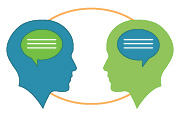Intro Link to this section
 Discourse is the medium for shared sense-making within a community of learners. This is reflected in the Common Core State Standard for Mathematical Practice #1 “Make sense of problems and persevere in solving them.” In addition, discourse makes our thinking public and allows us to negotiate what we mean with others. This is reflected in the Standard for Mathematical Practice #3 “Construct viable arguments and critique the reasoning of others.” This standard states that “students at all grades can listen or read the arguments of others, decide whether they make sense, and ask useful questions to clarify or improve the arguments.”
Discourse is the medium for shared sense-making within a community of learners. This is reflected in the Common Core State Standard for Mathematical Practice #1 “Make sense of problems and persevere in solving them.” In addition, discourse makes our thinking public and allows us to negotiate what we mean with others. This is reflected in the Standard for Mathematical Practice #3 “Construct viable arguments and critique the reasoning of others.” This standard states that “students at all grades can listen or read the arguments of others, decide whether they make sense, and ask useful questions to clarify or improve the arguments.”
Classroom discourse offers the opportunity to connect a student's own everyday language with the specialized language of mathematics, thus reflecting the CCSS-M SMP #6 “Attend to precision.” Student discourse is our window to understand the mathematical strengths and challenges of the whole class as well as an individual student. It presents us a view of what our students know, what their current conceptions are, and how these might have developed. And yet, it is not simply a one-way street. In the process of trying to understand our students’ thinking, we gain perspective into our own mathematical understanding, thereby laying the foundation for a supportive learning community for teachers as well as students.
The SFUSD Math Core Curriculum is intended to promote discourse in the teaching and learning of mathematics. Each unit of study within the Core Curriculum has four rich math tasks as well as lesson series that are premised on group work and positive student-to-student interactions. Our role as teachers is described in broad terms as a facilitator who is listening carefully to students, framing appropriate questions, and mediating competing perspectives. Students are expected to develop problem-solving skills such as: defining problems, formulating conjectures, and discussing the validity of solutions.
Resources to Support Mathematical Discourse Link to this section
Here are some resources to promote mathematical discourse:
- 5 Practices for orchestrating effective math discussions
- Promoting discourse through effective questioning
- Using the Three Read Protocol, the Rule of Four, or a Gallery Viewing to make sense of and communicate about rich math tasks
- Using Math Talks to build math thinking and academic discourse
This page was last updated on February 24, 2023

